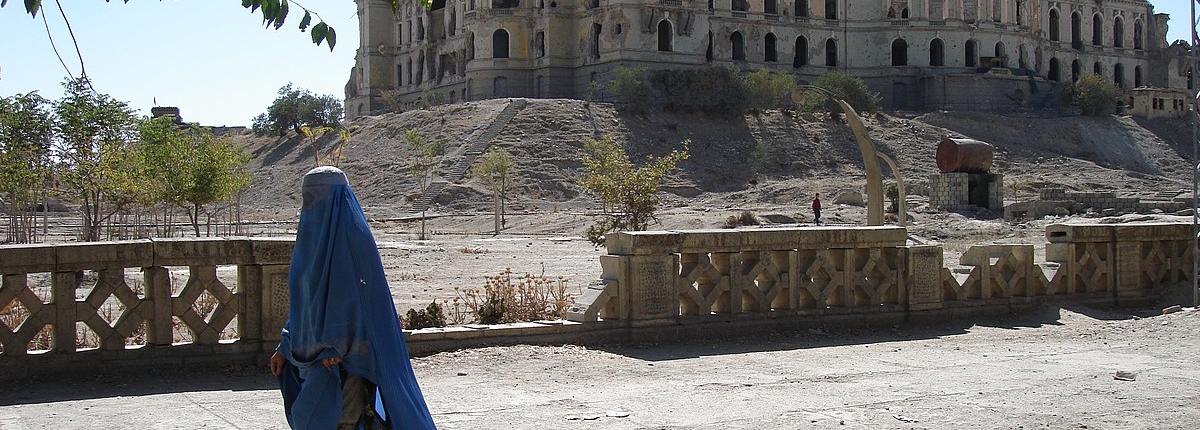Photo by Tahirshah999 on Wikimedia Commons
“Not Safe in Any Part of Your Country”: Eine junge Hazara aus Kabul berichtet von ihrem Alltag in Afghanistan
von Miriam Schirmer
Alia (aus Sicherheitsgründen wurde der Name von der Redaktion geändert), 26, wurde in Kabul geboren und wuchs dort in einer schiitischen Hazara-Familie auf. Nachdem sie einige Jahre als Hebamme gearbeitet hatte, entschied sie sich, Jura und Politikwissenschaft zu studieren. Als die Taliban im August 2021 Kabul einnahmen, verlor sie nicht nur ihren Job und das Recht, zu studieren: Sie erhielt immer wieder Morddrohungen – weil sie eine Frau und eine Aktivistin ist und der Minderheit der Hazara angehört – und war letztendlich gezwungen, mit ihrer Familie in den Iran zu fliehen.
Vor allem die Hazara als ethnische Minderheit in Afghanistan sind aktuell einer besonders akuten Bedrohung ausgesetzt. Hazara machen aktuell einen Anteil von etwa 9-14% an der Gesamtbevölkerung Afghanistans aus und haben ihre eigene Sprache und Kultur. Da sie mehrheitlich dem schiitischen Glauben angehören, wurden sie in der Vergangenheit oft diskriminiert und verfolgt und haben mit sozialen, wirtschaftlichen und politischen Benachteiligungen zu kämpfen. Mit der Machtübernahme der Taliban hat sich die Gefahr für Hazara vor Ort weiter deutlich verschärft (siehe auch unser Policy Brief zur Lage von ethnischen und religiösen Minderheiten in Afghanistan).
In diesem Interview erzählt Alia von ihrem Alltag in Afghanistan, warum sie letztendlich zur e Flucht gezwungen war und welche Art von Unterstützung sie von der internationalen Staatengemeinschaft fordert.
Genocide Alert: How would you describe women’s everyday life in Afghanistan at the moment?
The takeover of the Taliban has fundamentally changed women’s lives across the country, and restricted their freedoms. The Taliban deny women education, removed them from their jobs and introduced travel restrictions. One of my friends told her story to me: “I was walking home alone and I turned down a deserted alley and found Taliban fighters there. They shouted at me, because I didn’t wear a hijab and pointed their guns in my face. I lowered my head and said ’It won’t happen in the future.’ When I got home, I cried so much. Since then, I have fallen into a deep depression. I can’t look at all my colourful clothes in my closet, as they remind me of everything I have lost.” Right now, I have lots of stories like this in my life. Currently, in Afghanistan women can’t live as humans, because they don’t even have the basic rights in life. The women who had jobs before the Taliban came to power now lost their jobs. And some of them even have to beg in the streets. This is women’s everyday life in Afghanistan now.
Genocide Alert: What does it mean to be Hazara in Afghanistan at the moment? And how does the current situation compare to that of Hazara women before the Taliban took control of the country?
Right now, being Hazara means you are not safe in any part of your country, including educational centres, hospitals, and even your own house. The current situation is worst for Hazara women. The Taliban see Hazara women as a subordinate and inferior group. Before the Taliban took control of the country, Hazara women had an active and visible presence in public life and contributed meaningfully to it. Most of them supported their families financially. Hazara women and girls were in the military, skiers, cyclists, and performers in art festivals – their presence was visible in public sectors. And now they can’t even go out of their house.
Genocide Alert: In what ways did the situation change for you personally when the Taliban assumed power?
I was the only supporter of my family before the Taliban resumed power in Afghanistan. I was trying to buy and prepare the necessary things that my family needed, especially my younger brother and sister. When the Taliban captured the country, the situation changed for me. It was like a storm that destroyed everything in my life. I lost my jobs; my sister was in 9th grade at school but the Taliban didn’t let girls go to school. They also arrested my brother once, just for some tattoos he has on his arm. He is just 15 years old. I passed all these military tanks when the Taliban assumed power and, to be honest, I can say that even to be alive in this situation is difficult for me.
We have changed our house several times during this almost one and a half years because of security reasons, indirect threats, like social media. I expected that the existing problem will be solved in the period of time but the threats have been increasing extremely.
Because of these security problems I decided to leave Afghanistan almost one month ago. I came to Iran; I didn’t have any choice. I had to choose between bad and worse and I chose bad. Now I am living in Iran with my family, with my mother, my younger sister and brother and with lots of difficulties. We can’t rent a house for living here because we’re Afghans. We can’t even buy bread, because almost all the bakeries only sell to those people who have bank cards and as Afghans, we can’t have that.
And really, I’m so disappointed about my future and the future of my family and also the future of all the women in Afghanistan.
Genocide Alert: What are your friends back in Afghanistan telling you about the recent developments regarding the ban for women to study or to work at NGOs?
Restrictions of women from their roles and universities, of course, are the most important regulations of Taliban nowadays. One of my friends applied for a job at one of the NGOs. She was qualified for the job and completed all the steps to obtain it, but unfortunately in the early morning of the first day of her job, the manager of the office called her and said “Please forgive us, but according to some policies you cannot work here because of your gender.” This is the situation for women and girls in Afghanistan.
Genocide Alert: In what ways do you think the international community could have a positive impact on the current situation? What role, if any, do you think it should play and which actors, in particular, should get involved?
There are a lot of ways for the international community to have an impact on the current situation of Afghanistan: For example, human rights should receive sustained foreign policy attention. Second, the Taliban should not be recognized as legitimate rulers of Afghanistan, while they continue to harbour terrorists and violate international human rights agreements. Third, the international community should provide humanitarian relief without empowering the Taliban.
The international community could have a positive impact in the current situation in many ways. But they must want to have a positive impact, otherwise, there is no way.
Right now, there aren’t any attempts to improve the situation of Hazara from within the society, because all Hazara women are disappointed and cannot even think of their future. The international community should evacuate them from Afghanistan, because, in this situation, even being alive is impossible for women, especially Hazara women in Afghanistan.
Genocide Alert: Do you think you could ever go back to Afghanistan? If so, under what circumstances?
I hope that one day I will go back to Afghanistan, because it’s my country. I was born and grew up there. I don’t need any special circumstances, just for the government to at least see women as humans and give them the fundamental rights that every human being has. Finally, I ask the international community not to leave Afghan women, especially Hazara women, alone, because they are in a very bad situation. Please, help them.
Das Interview wurde am 07. Januar 2023 geführt.

